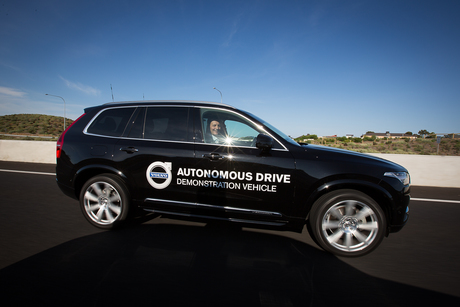Autonomous cars prove popular with Australians

A new study indicates that seven out of 10 Australians would like access to self-driving cars.
The research was coordinated by the Australian Driverless Vehicle Initiative (ADVI) and surveyed more than 5000 Australians aged 18 and over.
It found that that the majority of the Australian community is already willing to trust self-driving cars in situations where they prefer not to drive. 82% of those surveyed believe driverless vehicles will provide greater mobility for people with driving impairments, while almost three-quarters indicated that they wanted an autonomous car to transport them when they felt physically or mentally unable to drive themselves.
The most likely activity Australians said they would spend their time doing in driverless cars was observing scenery (78%) followed by interacting with passengers (76%).
“It’s just under a year since ADVI led the first trial of autonomous cars on Australian roads, and fully driverless vehicles aren’t yet even available to the public, but the Australian public is already quite advanced in its thinking,” said lead researcher Professor Michael Regan, Chief Scientist-Human Factors at the Australian Road Research Board (ARRB Group).
“Given the lack of community interaction with self-driving cars to date, it’s encouraging that almost half (47%) of the Australian population believe they will be safer than human drivers,” said Regan.
However, one-quarter disagree that driverless cars will be safer, while another quarter remain undecided. According to Regan, this highlights the importance of continued community education by governments and industry to ensure the safety benefits are communicated and individual incidents don’t delay their safe introduction onto Australian roads.
“This research is a critical first step to understanding public sentiment towards driverless vehicles, so that government and industry can continue working to bring the community along on the journey towards a driverless future and all of the social, safety, economic, environmental and other benefits automation can bring,” he said.
The 80-question survey was designed by ADVI’s Scientific Working Group and approved by the human ethics committee at the University of NSW. It will provide the most in-depth insight into Australians’ perceptions of driverless vehicles to date and form the baseline for ADVI’s proposed annual survey.
The survey results will be used to inform public policy, regulation, research, marketing and vehicle design.
“ADVI’s academic partners have worked together to develop a scientifically designed survey that targets a large, truly representative, sample of the Australian population, which addresses those issues most important to its government, industry and academic partners. When the full findings from the research are published early next year, they will not only help inform the introduction of driverless vehicles in Australia, but inform similar initiatives going on around the globe,” Regan said.
The research comes on the back of an economic report released by ADVI, which found Australia could unlock $95 billion per year in economic value and generate 16,000 new jobs by taking a more proactive approach to the introduction of autonomous vehicles in Australia.
Lenovo, NVIDIA launch full-stack AI solutions
Lenovo has unveiled a portfolio of solutions for building and deploying AI agents utilising...
Elastic expands observability partnership with Tines
Elastic and Tines have jointed forces to deliver a joint product offering that promises to...
Visa B2B Integrated Payments launches in Australia
Visa has partnered with ANZ, NAB, Westpac and HSBC to launch its SAP-integrated Visa...




